Content
- Types of crowns
- Metal crowns
- Metal-plastic crowns
- Metal-ceramic crowns
- Metal composite crowns
- Metal-free crowns
- How to install
- Rating
- 1st place Ivoclar Vivadent
- 2nd place Vita InCeram Alumina
- 3rd place Noritake
- 4th place Duceram
- 5th place DeguDent
- Selection recommendations
- Video about dental crowns
Dental crowns are dental products, which are used for the prosthetics of molars, incisors and premolars with signs of severe decay or caries damage. Dental prostheses of this type allow you to completely restore the aesthetic appearance of the dentition, eliminate its cosmetic and pathological defects.
A prerequisite for installing a dental crown over a damaged tooth is the presence of a healthy root without signs of inflammation in its bone structure and adjacent to it tissues.
Types of crowns
Dental crowns are divided into 8 main categories. The classification of dental prostheses of this type is carried out according to the material from which they are made by the manufacturer.
The installation of metal dental crowns is the most inexpensive type of dental prosthetics. Orthopedic products of this type began to be installed at the beginning of the last century. In modern dental practice, metal crowns are used less and less, since most patients prefer to prosthetics the jaw apparatus with orthopedic products that are as similar as possible to own teeth.
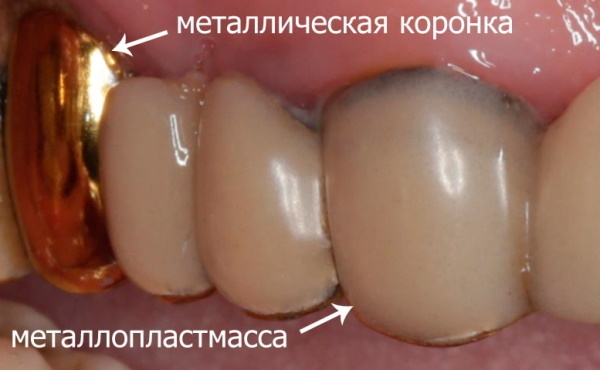
The following advantages of using crowns made of metal are distinguished:
- material strength;
- durability of service;
- low cost.
Metal crowns have one but very important drawback. Dentures of this type are characterized by unsatisfactory aesthetic properties. Orthopedic products of this type make the smile less attractive. The average cost of metal crowns is 6,000 rubles.
Dental crowns based on metal and plastic are another budget option for dental prosthetics. The average service life of this type of orthopedic products is 5 years. This type of crown is made of high quality metal, the surface of which is covered with a layer of plastic. This prosthetics option is suitable for people who, after dental treatment, want to have an aesthetically pleasing smile, but have a limited budget.
The following advantages of metal-plastic crowns are distinguished:
- in comparison with other dental prostheses are of low cost;
- differ in the lightness of the material;
- are subject to restoration renewal, which is performed during a routine appointment with a dentist.
Plastic-coated metal dental crowns have the following disadvantages:
- limited service life (in most cases, repeated replacement of orthopedic products of this type occurs after 5 years of their use);
- poor resistance of plastic material to the effects of natural and chemical dyes that are present in the composition of food;
- low level of strength and susceptibility to mechanical damage;
- poor biological compatibility with gum tissue (there is a high risk of developing an inflammatory process).
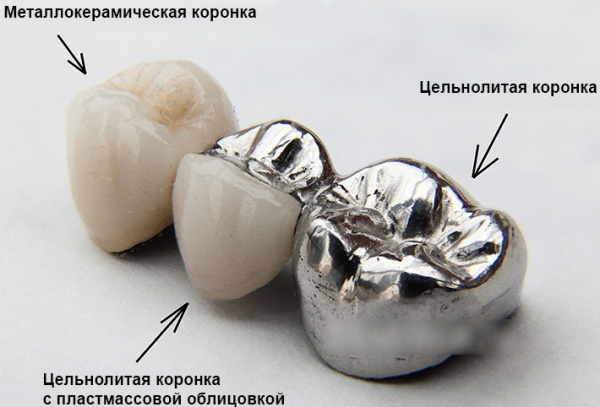
Metal-plastic crowns are not recommended for installation in patients who are prone to allergic reactions. The plastic in the upper layer of the denture increases the likelihood of symptoms of local irritation. The average cost of crowns based on metal and plastic is 4500 rubles.
Types of dental crowns differ in the quality characteristics of the material from which they are made. Orthopedic products based on cermet are prostheses with a combined composition, which are distinguished by high strength and long service life.
The basis of this type of dental crown is an alloy of precious metals, cobalt, nickel or chromium. The aesthetic appearance of the prosthesis is provided by a ceramic surface that imitates the color shade of the patient's own teeth.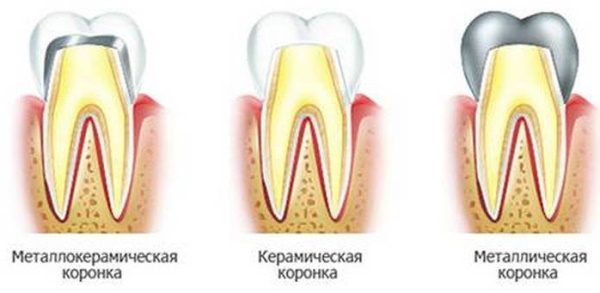
The advantages of installing metal-ceramic crowns are as follows:
- the material of the dental construction is characterized by good biological compatibility with the gum tissue;
- the ceramic coating of the crown has a more natural look, and also completely imitates the natural color of tooth enamel;
- the strength indicator is much higher than that of plastic-coated dental structures;
- do not stain with pigment substances contained in food and beverages;
- the average service life of metal-ceramic crowns is at least 10 years.
In order for dental products of this type to meet the above-mentioned quality characteristics, they must be made only of high-quality materials. Otherwise, their service life is sharply reduced.
The following disadvantages of metal-ceramic structures are distinguished:
- high price;
- as a result of a strong impact, prolonged interaction with coarse and solid food, ceramics tend to crack;
- after damage to the ceramic coating, the metal crown is exposed, which immediately leads to a loss of aesthetics of the dentition;
- have a large mass.
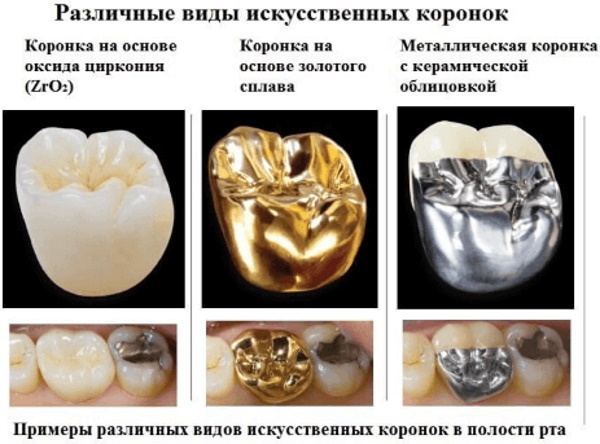
A qualified orthopedic dentist with extensive practical experience can establish metal-ceramic crowns are of such high quality that their appearance will surpass natural teeth the patient. In this case, the service life of the prosthesis will exceed 10 years. The average cost of metal-ceramic crowns is 9,000 rubles.
In terms of their quality characteristics, metal-composite crowns are similar to orthopedic products made of metal and ceramics. The only difference between these prostheses is that in the first case, ceramics are used, and the outer shell of the dental structure of the second type is a photopolymer material.
Installation of metal-composite crowns has the following advantages:
- installed on a previously prepared and ground tooth, and can also be fixed on the surface of the implant;
- it has a thin coating, which makes the dentition more accurate and aesthetically pleasing;
- allows you to choose a shade of photopolymer material that repeats the color of the enamel of the patient's own teeth;
- the lightness of the composite material;
- the ability to install crowns on all types of teeth.
Some dentists practice the use of metal-composite crowns in the treatment of patients undergoing implantation. In this case, the denture is put on over the metal part of the implant at the stage of its engraftment in the tissues of the jaw apparatus. The metal-composite crown is so light and strong that it protects the installed implant from negative factors.
Dental products made of photopolymer coated metal have the following disadvantages:
- during operation, they gradually change their color shade towards darkening;
- there is a risk of a local allergic reaction to the chemicals that make up these crowns;
- the composite coating of dental prostheses is susceptible to staining with chemical and natural dyes contained in food.
After installing metal-composite crowns, dentists remind their patients about a number of restrictions that must be observed throughout later life. From the daily diet, you will need to completely eliminate coloring drinks and food.
For a person who has metal-composite crowns, coloring fruits and vegetables, black tea, coffee and cocoa are strictly prohibited. If you neglect these rules, the photopolymer surface of the dental product will quickly darken.
The latest development in dental orthopedics is metal-free crowns. Structures of this type are made entirely of ceramics, aluminum oxide or zirconium dioxide.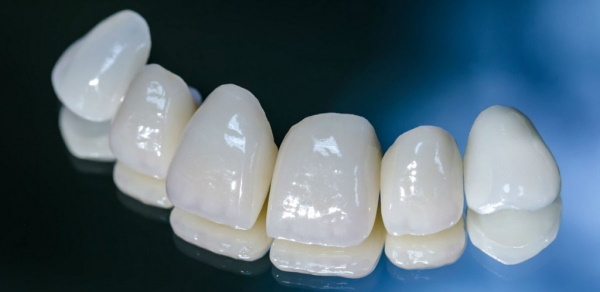
The advantages of using these products are as follows:
- light weight;
- excellent biological compatibility with gum tissue with minimal risk of developing an inflammatory process;
- hypoallergenic material;
- small thickness of the prosthesis;
- installed on the front teeth, molars of the chewing group and canines;
- high aesthetic properties.
An important advantage of metal-free crowns is that for their installation, a minimum turning of the patient's own tooth, which has external defects, is carried out. Due to this, the safety of the molar is ensured, the service life of its root part is extended.
The disadvantages of metal-free crowns include their lower strength. Ceramic products are susceptible to cracking and mechanical damage. Crowns made of aluminum oxide cannot be placed on chewing teeth, as this type of denture is too soft. In this regard, orthopedic products of this type have not yet found widespread use in dental practice. The average cost of completely metal-free crowns is 18,000 rubles.
How to install
The types of dental crowns are classified according to the type of base material and surface material. At the same time, the installation of orthopedic structures of this category is carried out according to one generally accepted medical protocol with minor differences depending on the clinical case. Closing a damaged tooth with a dental prosthesis takes place in several stages. The table below describes in detail the step-by-step algorithm of actions that the orthopedic dentist performs during the installation of dental crowns.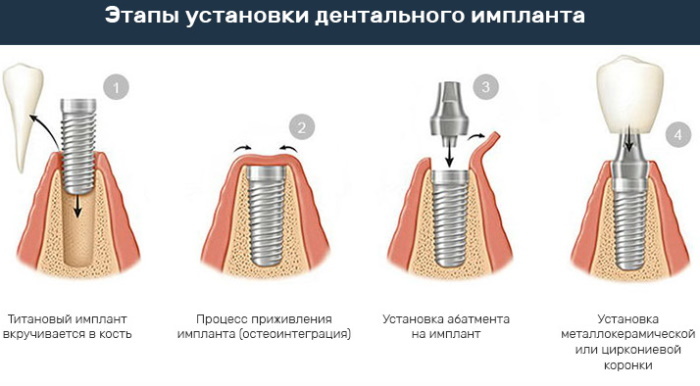
| Organization of the therapeutic process | Doctor's actions |
| Step 1. Specialist consultation | The dentist examines the patient's oral cavity, and then directs him to an X-ray of the diseased tooth to assess the condition of the root. |
| Step 2. Treatment | A diseased molar requiring prosthetics undergoes dental treatment. Depending on the clinical case, a method is used to remove tissues destroyed by caries with further filling. In especially severe cases, the doctor performs nerve depulpation. A pin is placed in the structure of severely damaged teeth, on the basis of which the upper part of the molar made of artificial dentin is built up. |
| Step 3. Turning | To put a crown on the surface of a diseased tooth, it is grinded with a drill, adjusting it to the parameters of a dental prosthesis. |
| Step 4. Selecting an impression | Before proceeding with the manufacture of the crown, the attending physician takes an impression of the upper and lower jaw, which are filled with plaster. |
| Step 5. Forming a 3-D model | On the basis of the impression of the patient's dentition, a computer 3D model of the jaw apparatus is created. This approach allows you to calculate the risks of complications, to choose the correct parameters of the prosthesis and its shade, which best matches the color of the enamel of the rest of the teeth. |
| Step 6. Installation of temporary crowns | A sharpened tooth needs protection from bacterial microorganisms, sour, hot, too cold food and drinks. Therefore, a temporary crown made of polymer material is put on top of the molar. |
| Step 7. Prosthesis production | On the basis of casts and a three-dimensional computer model, a crown is made in a dental laboratory. |
| Step 8. Fitting the crown | At this stage, he tries on the finished product with its partial fixation. The patient assesses his feelings while talking and eating. A prosthesis that causes discomfort or inconvenience is subject to additional modification. |
| Step 9. Final commit | The successful fitting of the crown ends with its complete fixation on the prepared tooth using dental cement. |
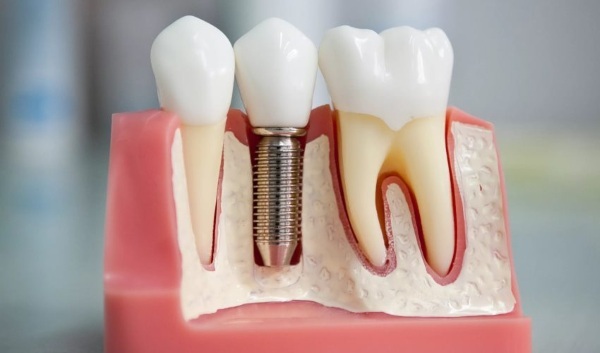
A well-performed installation of the crown allows you to restore and extend the life of even a badly damaged tooth. The patient receives a beautiful smile, and the chewing load is evenly distributed between the rest of the molars. Dental prosthetics using crowns has a much smaller number of contraindications than implantation.
Rating
The types of crowns for teeth differ not only in the properties of the materials from which they are made, but also in the level of quality, hypoallergenicity, strength, price range and durability.
1st place Ivoclar Vivadent
Ivoclar Vivadent metal-ceramic dental crowns are classic dentures that combine a high level of aesthetics and durability. Orthopedic products of this type are manufactured in Germany. Dental technicians at Ivoclar Vivadent use special fiberglass to give the crown the most natural look possible.
The metal base of the prosthesis is a guarantee of its durability under the influence of the chewing load. The single-layer ceramic coating has the property of translucency, saturates the artificial tooth with natural tones. The average cost of Ivoclar Vivadent dental crowns is 6,000 rubles.
2nd place Vita InCeram Alumina
Modern German crowns Vita InCeram Alumina are used for high-quality prosthetics of patients with signs of severe dentition defects. Orthopedic products of this type are made from aluminum oxide. Vita InCeram Alumina dental crowns are distinguished by their extended service life and excellent aesthetic properties.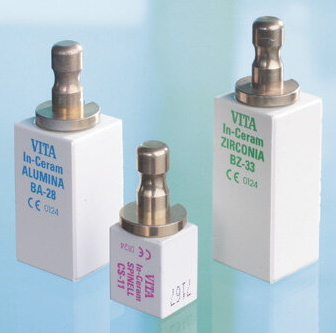
Prostheses of this type are indicated for use in patients who have diagnosed with the following health problems:
- weakness of the gums caused by a hereditary factor or concomitant diseases of the body;
- increased tendency to manifest allergic reactions to metal alloys;
- weakened immunity and a high probability of inflammatory lesions of the gums.
Vita InCeram Alumina aluminum oxide crowns are used for the front teeth prosthetics of the smile zone. Orthopedic devices of this type are not suitable for patients who need to replace destroyed molars of the chewing group. The average cost of Vita InCeram Alumina crowns is 11,500 rubles.
3rd place Noritake
Noritake metal crowns are covered with the finest layer of high quality porcelain. Dental products of this type are characterized by a very long service life and high aesthetic properties. Despite the ultra-thin layer of veneering material, the metal base of the prosthesis remains completely invisible to others. Noritake crowns have been manufactured in Japan for the past 20 years.
Orthopedic products of this type have the following quality characteristics:
- durability of service;
- a thin layer of porcelain covering;
- hypoallergenic;
- minimal likelihood of gum inflammation;
- strength and absence of chips;
- do not change color towards darkening even if they are used for a long time.
For patients who do not want to install porcelain dentures with a metal base, Noritake all-ceramic dental crowns have been developed. The average cost of this type of dental products is 5,000 rubles.
4th place Duceram
The German dental company Duceram manufactures quality Duceram Plus dental crowns, which are created from one-piece hydrothermal ceramics with an increased level of strength. The advantage of this type of orthopedic products is that in appearance they completely imitate the patient's own teeth, do not collapse under the influence of chewing load, retain their natural Colour.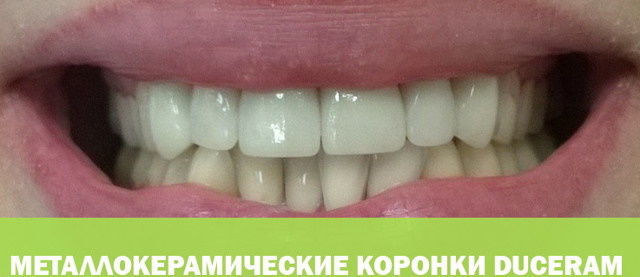
Depending on the customer's wishes and dental indications, Duceram specialists produce metal-based prostheses with hydrothermal ceramic veneers. The average cost of dental crowns of this brand is 7000 rubles.
5th place DeguDent
Dental crowns from the DeguDent company are considered one of the best dental prostheses for the restoration of partially destroyed molars, incisors and premolars. This manufacturer is part of the world famous German holding company Dentsply.
Orthopedic products of this company are characterized by the following quality characteristics:
- high strength;
- aesthetics;
- high-quality metal base with a composite shell or all-ceramic prostheses;
- duration of service;
- no chips and damage even after eating rough food.
Dental crowns from the DeguDent company do not darken after a long period of use, and do not stain under the influence of natural and chemical dyes. The average cost of this type of dental products is 15,000 rubles.
Selection recommendations
Types of crowns for teeth differ in quality characteristics.
In the process of choosing dental prostheses of this category, the following recommendations must be observed:
- Give preference to cermet, all-ceramic or metal-composite products.
- Do not choose dentures that only consist of metal.
- Buy crowns cast from hypoallergenic alloys.
- Do not purchase orthopedic products that contain a plastic coating.
- Choose crowns with a surface layer that is resistant to mechanical damage, acidic environment, natural and chemical dyes.
- Buy dentures with a high level of strength, so that there is always an additional margin of their resistance to external damage.
- Listen to the advice and opinion of an orthopedic surgeon, who conducts therapeutic measures to restore defective areas of the dentition.
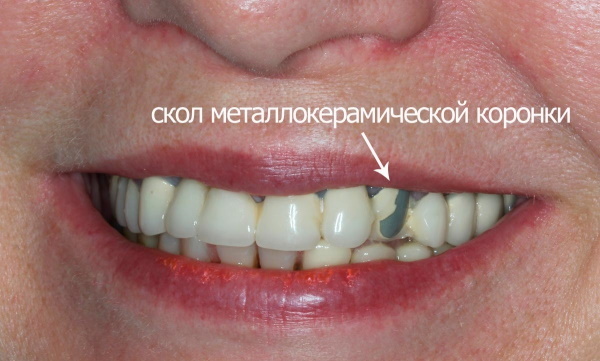
It is important to remember that all dental crowns that are purchased for planned prosthetics must have an appropriate quality certificate. It is better to overpay a certain amount of money, but buy an original orthopedic product with high quality indicators.
Dental crowns are a type of dental prosthesis for restoring the integrity of one or several molars, incisors, premolars in the row of the lower and upper jaw. Orthopedic products of this category are installed on top of a previously prepared tooth that has serious damage or has been partially destroyed by total caries.
The very first dental crowns used in dental practice were all-metal prostheses. In modern orthodontics, metal-ceramic, metal-free, all-ceramic and metal-composite types of prostheses are used. The installation of crowns has a much smaller number of contraindications than the implantation of artificial teeth.
Video about dental crowns
All about dental crowns:



